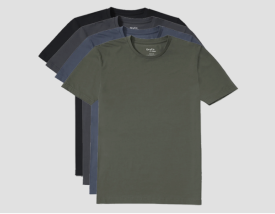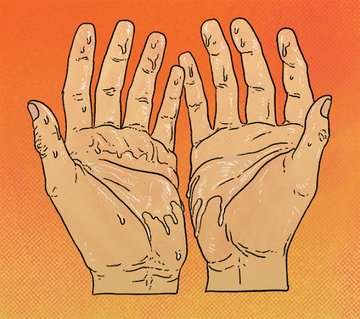Excessive sweating at work is a real bummer. It’s uncomfortable, it can be unsightly and it often makes sufferers highly self-conscious. Unfortunately, excessive sweating can have a negative impact on one’s career, both directly and indirectly. The effects of excessive sweating in the workplace can be far-reaching. This piece will take a look at the “domino effect” of excessive sweating and along with practical tips to prevent it from happening.
How Excessive Sweating Can Affect Productivity
On any given day at work you likely have a laundry list of things to do. If you’re an office worker, you have emails to respond to, got phone calls to make, meetings to attend, reports to create or customers to meet. These tasks all require a great degree of focus and time.
Trying to conceal excessive sweating also requires a lot of focus, not to mention, time and energy. Who wouldn’t devote at least some attention to hiding sweat? The problem, though, is that masking excessive sweat becomes too time-consuming.
You lose focus on what's important. The sensation of sweating also can create an unpleasant physical experience that demands attention and relief that further exacerbates your difficulty concentrating.
Excessive sweating can also reduce your ability to complete tasks that require manual dexterity and fine motor skills movements. Sweaty palms can make it harder for you to grasp tools or gears needed to operate heavy machinery and even compromise your safety.
Takeaway: Reducing your output of sweat is often enough to help you reshift your focus on what matters. Even if it doesn't fully disappear, you’ll get your job done when your mind is not preoccupied with staying dry.
How Excessive Sweating Affects Your Perception of Self
Hyper awareness of excessive sweating contributes to lower self-esteem. With lower self-esteem, you're more likely to hold back and see yourself as having a “defect”. This is an isolating feeling.
You may assume that you’re being watched or scrutinized, and that further perpetuates the cycle of low self-esteem whether your assumptions are true or not. The inevitable result of this is an increase in stress and even anxiety. For some, these negative emotions fuel depression.
Takeaway: When your sweating is under control, you will pay less attention to negative feelings about yourself. Your self-esteem will remain intact.
How Excessive Sweating Affects Social Skills at Work
One of the biggest repercussions of having uncontrolled hyperhidrosis are the negative social impacts. There's a tendency to avoid social situations where excessive sweating may become apparent to shield.
Think about simple social exchanges widely practiced before the COVID-19 pandemic such as handshakes. These were excruciating gestures for a person with excessive sweating. The hyperhidrosis sufferer doesn’t want to shake hands with someone who may then expose them as the employee with sweaty palms. If someone has to deal with excessive sweating at the workplace, they may avoid such interactions altogether.
Excessive sweating can also pose a challenge when dealing with clients. A sweaty appearance can give a client the impression that a worker has poor hygiene even if this is completely untrue.
The culmination of negative social feedback can lead one to isolate themselves, garnering them labels such as “antisocial”, “standoffish”, or “aloof”. These are labels that only traumatize the employee and further reduce their job performance.
Takeaway: Reduction of excessive sweating is a powerful step in restoring one’s social confidence. When you and others don't notice excessive sweating, you don't have to be self-conscious when interacting with others.
How Excessive Sweating Affects Job Promotions
A job promotion typically presents itself when an employee has demonstrated exceptional productivity, confidence, and has shown him or herself to be a team player.
With excessive sweating in the mix, employees may have lackluster track records in all areas. It's tough being productive when you devote so much of your time trying to hide excessive sweating. It's tough believing in yourself when you feel as if others are judging you for looking too sweaty. It's tough being social when you have to avoid common interactions that make you or others uncomfortable. All of these behaviours - which are understandable for a hyperhidrosis sufferer - make the chances of getting promoted much harder.
Takeaway: Reduction of excess sweating allows you to regain your productivity, your confidence and your desire to build strong relationships at work. When you experience those gains, you'll have a greater chance of being selected for a promotion when the opportunity arises.
How Excessive Sweating Affects Your Psychological Well-Being
Our jobs play a significant role in forming our self-identity. When excessive sweating robs one of their ability to perform well at their job, they are likely to feel like an imposter. Being unhappy and unproductive increases stress, anxiety and the risk of other mental health challenges. The result is poor mental health which only worsens job performance and creates a vicious cycle.
Takeway: Your job affects your mental health and your mental health affects your job. With excessive sweating out of the picture, you can function and focus on your job with greater passion. With increased job performance and experiences, you can enjoy the fruitage of your labour as well as healthy work relationships, which promotes better psychological health.
Reclaiming Your True Self Despite Excessive Sweating
You'll notice for each of the five points that we've listed above there is a takeaway that emphasizes the importance of controlling excessive sweating for the sake of your career.
You might not be able to completely eliminate excessive sweating. However, you can reduce it to the point that it’s barely noticeable by you or others. For many employees, getting it down to a level where it’s barely noticeable is enough to help them feel at ease and in control at work. How can you get there?
Identify Your Triggers
Practice mindfulness to identify when you sweat most and what may intensify your sweating. Be patient and remember that the triggers may not be obvious or readily known. With that said, common triggers of excessive sweat include:
- Greasy foods
- Caffeine
- Alcohol
- Cigarettes
- Prescription and recreational drugs
- Anxiety/Stressful situations
Make Well-Informed Lifestyle Changes
If you notice a pattern or what seems like a trigger, write it down and do your best to avoid it. Always address the basics by eating a nutritious diet, getting plenty of exercise, getting adequate sleep and managing your stress. Follow your doctor's advice when it comes to medication and treatments, some of which may include:
- Antiperspirants
- Botox
- Endoscopic Thoracic Sympathectomy
- Iontophoresis
- Medications
- Dietary changes
Incorporate Sweat-Resistant Fabrics
Keep in mind that your choice of clothing plays a major role in how you perceive excess sweat and how much it shows. Sweat resistant clothing for professional settings can do wonders. They can help you feel more comfortable while also concealing the appearance of excessive sweat. Sweat resistant clothing usually takes the form of an undergarment, acting as a shield against visible signs of sweating. Neat Apparel's sweat resistant clothing contains:
- Sweat activated fabric that blocks moisture from escaping the shirt
- Maze-like fabric construction that diffuses sweat so that it does not linger and cause discomfort
- Moisture wicking ability that allows the sure to stay dry
A Sweat Resistant Protocol for a Sweat-Free Work Life
If excessive sweating is holding you back from flourishing at work, it's time for you to regain control. That may seem like a tall order when it seems to have no cause at all. Fortunately, you can reduce hyperhidrosis by making some lifestyle changes, being aware of your triggers and wearing sweat resistant clothing. As long as you are able to redirect your focus on your job, sweat will have no power over you.








